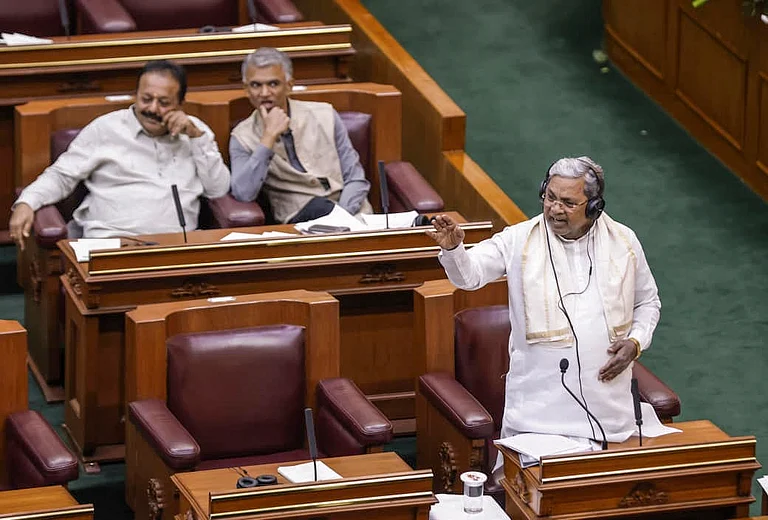In the absence of explicit laid-down laws and provisions, the courts lean heavily on precedents and interpretations of existing laws to decide cases in front of them.
There is no law specifically addressing live-in relationships, but the Indian judiciary has developed jurisprudence over the years through a series of judgements. According to the SC judgment in Badri Prasad Vs Dy. Director of Consolidation (1978) live-in relationships in India are legal but subject to caveats like age of marriage, consent and soundness of mind.
The question of the legality – or legitimacy – of live-in relationships was relatively simple for the courts to settle as fundamental freedoms are mostly elastic and courts have interpreted them broadly. However, several laws in different aspects pertaining to live-in relationships continue to be too rigid for the courts to extend or interpret them for the benefit of live-in partners.
The legality of live-in relationship stems from the Articles 19(a)- right to freedom of speech and expression and Article 21- protection of right to life and personal liberty of the Constitution of India.
“Right to life emphasizes on the freedom of an individual to enjoy life by all means unless it is prohibited by existing laws. It's a free society and one can live anyhere they wish to live. In the context of live-in relationships, Right to Life under Article 21 is applicable in a sense that an individual has the right to live with a person of their interest with or without marriage," says Advocate Debrup Bhattacharyya, who practices at Calcutta High Court to Outlook.
Court verdicts legalizing live-in relationships
The legitimacy of live-in relationships could be traced to the 1970s.
In 1978, the Supreme Court in Badri Prasad Vs Board of Consolidators ruled that a presumption of marriage arises if a man and a woman have lived as husband and wife for a long time.
“A strong presumption arises in favor of wed-lock where the partners have lived together for a long spell as husband and wife. Although the presumption is rebuttable, a heavy burden lies on him who seeks to deprive the relationship of its legal origin," ruled the SC.
In 2001, the Allahabad High Court in Payal Sharma Vs Nari Niketan ruled that it is not illegal for a man and a woman to live together. The HC also drew a distinction between law and morality.
“Hence, she is a major [adult] and she has the right to go anywhere and live with anyone. In our opinion, a man and a woman, even without getting married can live together if they wish. This may be considered immoral by society but it is not illegal," said the HC.
In 2006, the Supreme Court in Lata Singh Vs State of UP ruled that two persons of opposite sex living together are not doing anything illegal. In 2010, the SC in S. Khushboo Vs Kanniammal & Another. reiterated the 2006 verdict and noted "A live-in relationship between two consenting adults of heterogenic sex does not amount to any offense (with the obvious exception of 'adultery'), even though it may be perceived as immoral".
The adultery exception is also invalid now as adultery was decriminalized in Joseph Shine Vs Union of India in 2018 by the Supreme Court.
In 2013, the Supreme Court in Indra Sarma vs VKV Sarma ruled that the woman partner in a live-in relationship is protected under the Protection of Women from Domestic Violence (PWDV) Act, 2005.
Rights of partners in live-in relationships
In 2013, the Supreme Court ruled that women are protected under the PWDV Act, 2005 as live-in relationships fall under Section 2(f) of the law which defines a domestic relationship.
It defines domestic relationship as “relationship between two persons who live or have, at any point of time, lived together in a shared household, when they are related by consanguinity, marriage, or through a relationship in the nature of marriage, adoption or are family members living together as a joint family”.
The SC ruled that live-in relationships fall under "a relationship in the nature of marriage" mentioned in the sub-section.
In 2010, the Supreme Court in Velusamy Vs D Patchaimal laid down criteria for live-in relationships to be legal, which is the closest to the 'codification' of the question of live-in relationship, in the absence of any specific law on the subjects.
The Supreme Court laid down the following criteria:
The couple must hold themselves out to society as being akin to spouses
They must be of legal age to marry
They must be otherwise qualified to enter into a legal marriage, including being unmarried
They must have voluntarily cohabited and held themselves out to the world as being akin to spouses for a significant period of time
Therefore, certain live-in relationships, where two married persons or one married and another unmarried person are staying together, do not have legal basis.
Women are also eligible for alimonies in live-in relationships, according to the 2016 Punjab High Court judgement in Ajay Bhardwaj Vs Jyotsana case.
Advocate Bhattacharya tells Outlook, “Initially, Section 125 of Code of Criminal Procedure (CrPC) only allowed a married woman, who is unable to pay for herself, to claim alimony from the husband. But today, the Malimath Committee report has extended the definition of the term ‘wife’ to include a woman who has lived with a man like his wife for a considerable amount of time and thus is legally eligible to claim maintenance.”
Children born out of live-in relationships
In June 2022, the Supreme Court in Kattukandi Edathil Krishnan & Another Vs Kattukandi Edathil Valsan & Others ruled that children born to partners in live-in relationships can be considered legitimate. This is conditional in a way that the relationship needs to be long-term and not of ‘walk in, walk out’ nature.
“Long course of living together between a male and female will raise a presumption of marriage between them and the children born in such relationship are considered to be legitimate children,” said the SC judgement.
This extends property rights to such children as well. The SC said “the law presumes in favour of marriage and against concubinage”. If a man and woman consensually cohabited for a long period and their child cannot be denied the shares in the ancestral properties.
The Supreme Court has also ruled that such children are eligible to be part of family succession.
Bhattacharya tells Outlook, “The Supreme Court has said that a child born out of an illegitimate marriage or a live-in relationship is a legitimate child. Moreover, they are entitled to coparcenary rights on their ancestral properties as well.”
The concept of coparcenary rights originates from the legal treatise called ‘Mitakshara’ under the Hindu Succession Act, 1956, whereas the other existing treatise under the same act is ‘Dayabhanga’. These two differ from each other in terms of the nature of succession of ancestral properties.
Bhattacharyya elaborates, “Hindu inheritance laws are divided into two schools — Mitakshara and Dayabhaga. Dayabhaga applies to the Hindus from Bengal and Assam whereas Mitakshara includes the rest of India. The concept of coparcenary right comes from the Mitakshara school where the child, by birth, acquires automatic ownership on ancestral property even during the lifetime of the father whereas in case of Dayabhanga, the question of ownership comes only after the father’s demise.”
However, Indian jurisprudence is yet to provide for the property inheritance right of the two partners in a live-in relationship. As of now, it is out of bounds as live-in partners don’t fall within the ambit of Class-1 or Class-2 heirs under Hindu Succession Act, 1956.
Same-sex live-in relationships, unaddressed questions
The court rulings are contradictory when it comes to same-sex relationships.
In the 2010 Velusamy Vs D Patchaimal judgement, the conditions listed by the Supreme Court included the following point- they [live-in partners] must be otherwise qualified to enter into a legal marriage, including being unmarried.
Since same-sex marriages are not legal in India, same-sex live-in relationships should not be legal as well, but Odisha High Court in 2020 ruled that same-sex relationships are also legitimate.
“Therefore, we allow the writ application (criminal) and direct that the petitioner and the daughter of the Opposite Party No.5 have the right to decide their sexual preferences including the right to stay as live-in partners,” said the HC in a case involving two females wanting to stay together.
The HC while favouring the self-identification of gender said, “There is hardly any scope to take a view other than holding that the petitioner has the right of self-determination of sex/gender and also he has the right to have a live-in relationship with a person of his choice even though such person may belong to the same gender as the petitioner.”
Beyond this case, however, the legality of same-sex live-in relationship is likely to be in grey area as a SC ruling exists with a contradictory view.
There are more unaddressed questions, such as the question of protection from intimate partner violence, particularly sexual, to same-sex partners or men in heterosexual live-in relationships. The Indian Penal Code (IPC) Section 375 defines ‘rape’ as an offence a man commits on a woman, so a man in a heterosexual or a woman in a same-sex live-in relationship do not have a recourse if they are violated.
Moreover, there is no provision for alimony for men and the SC also problematically ruled that only men initiate live-in relationships.
“Relief under the PWDV Act, 2005 is not available to men in live-in relationships. In this connection, it is pertinent to mention that in the case of Khushboo Vs Kanniamal, the Court observed that ‘a live-in relationship is invariably initiated and perpetuated by men’,” note authors in the paper Live-In Relationships in India- Legal and Psychological Implication in Journal of Psychosexual Health.
Moreover, the questions of succession and children’s legitimacy addressed so far concern Hindu family laws or Special Marriage Act only since India has personal laws according to religions. There is no clarity whether similar benefits extend to other religions, such as Muslims or Christians with two academics telling Outlook that alimony or legitimacy of children born out of live-in relationships is not permissible in Muslim personal laws.
Live-in relationships, which have pre-marital sex as an essential element, involve zina which is not permissible in Islamic law, says Iqbal Ali Khan, Professor, Faculty of Law, Aligarh Muslim University (AMU). Zina means pre-marital sex in Islamic law.
“Live-in relationships are nowhere mentioned in Muslim laws and they are not mentioned even in Hindu laws, but the courts through their judgements have legalised it for Hindus, even giving property rights to children born in such relationships,” says Waheed Alam, Assistant Professor, Faculty of Law, Shia PG College, Lucknow.
Alam adds that court rulings on live-in relationships so far do not extend to Muslim personal law and children of Muslim live-in partners would be considered illegitimate as per existing law.
Elaborating on the subject, Alam tells Outlook, “Since there is nothing written as law on this subject, the courts are interpreting existing laws on their own. There is a need to bring legislation on the subject so that there is clarity and courts don't bring conflicting rulings."



























